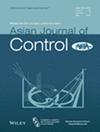Adaptive optimal control strategy of fuel economy for fuel cell battery storage system using in HEV applications
IF 2.7
4区 计算机科学
Q2 AUTOMATION & CONTROL SYSTEMS
引用次数: 0
Abstract
Fuel cell stack (FCS) is a practical power source for new energy vehicle applications, and fuel economy is a problem that many researchers are concerned about. In this paper, an adaptive real‐time control strategy aiming at improving fuel efficiency is proposed; the control purpose is to distribute the power requirement between the FCS and the battery to achieve good fuel economy. First, the FCS model is built according to experiment data, and in order to reflect the affection of the temperature to the proposed control strategy, the thermal model of the battery is established. Then the future power requirement is predicted via Bayes inference analysis. Based on the FCS model, the battery model, and the predicted power requirement, the real‐time control strategy is designed and solved with minimization principle optimization over the receding horizon. The proposed control strategy is validated both through simulation and hardware‐in‐loop (Hil) experiments on a 40 kW FCS. The results compared with the rule‐based (RB) strategy and the loss minimum strategy (LMS) show that the proposed control strategy can effectively reduce fuel consumption by 4%, and at the same time, it can help extend the life span of the battery by considering the temperature affection.混合动力汽车燃料电池储能系统燃料经济性的自适应优化控制策略
燃料电池堆(FCS)是新能源汽车应用的实用动力源,而燃料经济性是许多研究人员关注的问题。本文提出了一种旨在提高燃料效率的自适应实时控制策略,其控制目的是在燃料电池堆和电池之间分配功率需求,以实现良好的燃料经济性。首先,根据实验数据建立 FCS 模型,并建立电池热模型,以反映温度对控制策略的影响。然后通过贝叶斯推理分析预测未来的电力需求。根据 FCS 模型、电池模型和预测的功率要求,设计了实时控制策略,并在后退视界范围内采用最小化原则进行优化求解。所提出的控制策略在 40 kW FCS 上通过仿真和硬件在环(Hil)实验进行了验证。与基于规则的策略(RB)和损耗最小策略(LMS)的比较结果表明,所提出的控制策略能有效降低 4% 的燃料消耗,同时还能通过考虑温度变化来延长电池的使用寿命。
本文章由计算机程序翻译,如有差异,请以英文原文为准。
求助全文
约1分钟内获得全文
求助全文
来源期刊

Asian Journal of Control
工程技术-自动化与控制系统
CiteScore
4.80
自引率
25.00%
发文量
253
审稿时长
7.2 months
期刊介绍:
The Asian Journal of Control, an Asian Control Association (ACA) and Chinese Automatic Control Society (CACS) affiliated journal, is the first international journal originating from the Asia Pacific region. The Asian Journal of Control publishes papers on original theoretical and practical research and developments in the areas of control, involving all facets of control theory and its application.
Published six times a year, the Journal aims to be a key platform for control communities throughout the world.
The Journal provides a forum where control researchers and practitioners can exchange knowledge and experiences on the latest advances in the control areas, and plays an educational role for students and experienced researchers in other disciplines interested in this continually growing field. The scope of the journal is extensive.
Topics include:
The theory and design of control systems and components, encompassing:
Robust and distributed control using geometric, optimal, stochastic and nonlinear methods
Game theory and state estimation
Adaptive control, including neural networks, learning, parameter estimation
and system fault detection
Artificial intelligence, fuzzy and expert systems
Hierarchical and man-machine systems
All parts of systems engineering which consider the reliability of components and systems
Emerging application areas, such as:
Robotics
Mechatronics
Computers for computer-aided design, manufacturing, and control of
various industrial processes
Space vehicles and aircraft, ships, and traffic
Biomedical systems
National economies
Power systems
Agriculture
Natural resources.
 求助内容:
求助内容: 应助结果提醒方式:
应助结果提醒方式:


